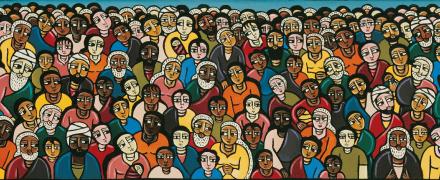Christianity and the World of Cultures

LauraJamesArt.com
The study of world Christianity begins with the basic premise that Christianity is, and from its very inception has been, a cross cultural and diverse religion with no single dominant expression. Throughout history, all Christians have lived in specific cultural contexts, which they have, to varying degrees, embraced and rejected. Regardless of a positive or negative attitude toward their surrounding culture, all Christians must respond to their surrounding context. It is in Christians of many and various responses that Christianity gains its unique multi-cultural and polyvocal texture as a world religion.
Those Christians who embrace surrounding cultures use indigenous language, music, art forms, and rituals as potent resources for their own ends. Christians have a history of taking that which is not Christian, and then filling it with Christian meaning. There are classic examples of this: Christians inherited Roman vestments and German Christmas trees. Yet even at a more basic level, Christians borrow pre-Christian languages and use them for Christian ends. Jesus did not speak Greek, Latin, or English, yet each of those languages has been used to tell his story and teach his message. As Christianity continues to find a home in new cultural settings, Christians continue to borrow new languages and cultures to tell the story of Jesus.
For those Christians who take a more guarded approach to surrounding cultures, their message will be one of caution. Nevertheless, reaction against culture can be as powerful for identity formation as would be accepting culture. Thus, Christians throughout time have taken stands against alcohol, polygamy, divorce, abortion, and a myriad of other issues.
Naturally, the fact that Christianity is polyvocal and multicultural leads to many different answers vis-à-vis culture. Some Christians might reject a certain practice while others gladly accept it. Debates over ethics and practice are intrinsic to the multicultural nature of the Christian religion. Thus, the Jesuits saw no harm in Chinese converts honoring their ancestor, while the Domincans and Franciscans called it idolatry. Western missionaries in Africa were more often than not solidly opposed to polygamy, while indigenous Church leaders were occasionally more willing to entertain the possibility. In today’s world, the questions of gender and sexuality fuel debates among Christians across cultural lines.
Yet this is not to say that Christianity lacks a core and is completely determined by surrounding culture. On the contrary, at the center of World Christianity is a story. It is the story of the relationship between God and the world, as told through the lens of Jesus Christ. The example, influence, and reality of Jesus have provided a touch point for all Christian traditions. Generations of Christians throughout the whole world have been consumed by the question, “who is Jesus?” And also “what does his life mean for us?” Christians across cultural lines also share various rituals—baptism, the Lord’s Supper, gathering for worship, and the reading of and reflection on scripture.
Thus, the study of world Christianity asks what it is that makes Christians unique as individual groups and coherent as a whole. It seeks to understand the cause of division and conflict both within the Christian community and also with the wider world. As Christians become increasingly aware of their cultural differences, the study of World Christianity will provide tools for navigating the diversity. It will also, hopefully, provide a space and a platform for discussing our differences and finding a common ground.
Stephen Lloyd
PhD Candidate, Graduate Division of Religious Studies
1 comment
Stephen, what an excellent wordsmith you are in your description of the collage that Christianity has evolved into! Thank you for your brilliant dispensation.